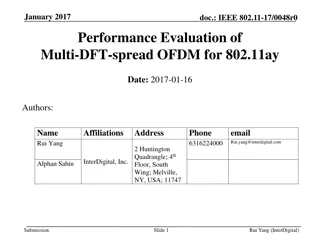Predictive DFT Mixing: Successes and Opportunities in Materials Science
Laurie Marks from Northwestern University discusses the successes and opportunities in predictive DFT mixing, focusing on the advancements in density functional theory, fixed-point solvers, and the approach taken in physics and pragmatism. The presentation includes insights on the applications of DF
9 views • 52 slides
Lattice Constants in Materials Using DFT Calculations
Using Density Functional Theory (DFT) calculations, we explore how to determine the lattice constant of simple cubic, face-centered cubic (fcc), and hexagonal close-packed (hcp) materials. By fitting numerical data and analyzing energy considerations, we predict lattice constants for various metal s
2 views • 17 slides
Density Functional Theory in Chemistry
Density Functional Theory (DFT) plays a crucial role in chemistry by uniquely determining molecular properties based on electron density. The Hohenberg-Kohn Theorem establishes the foundation, with the goal of finding an exact energy functional expressed in terms of density. Various concepts like th
2 views • 19 slides
Efficient Solver Techniques in CFD Simulations
This resource provides insights into the segregated solver approach in computational fluid dynamics (CFD) simulations, specifically focusing on the sweeping direction and its impact on computational efficiency and convergence rates. It discusses the benefits of employing the XY plane for 2D cases to
2 views • 50 slides
Numerical Integration in Density Functional Theory (DFT)
The application of numerical integration techniques in Density Functional Theory (DFT) is crucial for solving the Eigenvalue Problem and evaluating energy functionals. This involves partitioning integrals, approximating integrals at atomic centers, defining partition functions, and ensuring cell fun
3 views • 15 slides
Linearly Transformed Discretization Schemes for Plasma Simulations
Addressing the computational challenge of CO2 decomposition with plasmas, this study focuses on developing advanced discretization schemes and modern iterative linear solvers to ensure physical invariants are respected. The research explores the use of chemical invariants to simplify complex systems
3 views • 22 slides
Cutting-Edge TPC Simulation Techniques at Budker INP & NSU
Cutting-edge TPC simulation techniques implemented by researchers at Budker INP and NSU include framework implementations, event displays, background simulations, track distortions, and gas medium simulations. Researchers like Andrey Sokolov, Lev Shekhtman, Vijayanand KV, and Timofey Maltsev have co
4 views • 15 slides
Interactive Science Simulations by PhET - Engaging Learning Experiences
Explore PhET Interactive Simulations founded by Nobel Prize physicist Carl Wieman, offering over 120 interactive simulations across various scientific disciplines. From Energy Skate Park to Molecule Shapes, these simulations provide engaging, game-like experiences for students and scientists alike.
16 views • 13 slides
Density Functional Theory in Computational Chemistry
Dive into the formalism and applications of Density Functional Theory (DFT) through a comprehensive review of basic theory, equations, and numerical implementations. Explore concepts like Time-Dependent DFT (TDDFT) and Linear Response formalism, and discover its applications in studying plasmons, co
1 views • 26 slides
Insights into Summer 2017 Climate Variations and Heatwave Events
Climate research using climate reconstructions and model simulations for summer 2017, focusing on heatwave periods and temperature anomalies. Observations from instrumented sites and atmospheric soundings were utilized to analyze air temperature, soil moisture, and radiation. The study highlights th
0 views • 22 slides
CLIC Start-to-End Simulations Overview
Review of CLIC start-to-end simulations including main simulation codes, past results, and upcoming work. Focus on realistic performance assessments, tolerance evaluations, emittance transport, mitigation techniques, operational scenarios, luminosity studies, and tools used. Detailed information pro
6 views • 12 slides
Utah Valley University - Virtual Reality Implementation for Nanotechnology Education
Utah Valley University (UVU) introduces a nanotechnology course this fall, leveraging VR simulations to train students in nanofabrication and characterization techniques such as photolithography, electron beam lithography (EBL), sputtering, and microscopy. The VR simulations help students familiariz
1 views • 8 slides
Analysis of Cloud-Resolving Simulations Over Complex Terrain
Examining cloud-resolving simulations of moist convection over complex terrain using large eddy simulation (LES) and deep convective fluxes. The study includes characteristics of the simulations, numerical convergence, and turbulent diffusion. Results reveal insights into the behavior of convective
1 views • 20 slides
Applications of Density Functional Theory (DFT) in Various Fields
Density Functional Theory (DFT) is a powerful computational tool used in various scientific fields to understand complex chemical and physical phenomena. This theory allows for detailed analysis and prediction of material properties, reactions, and structures at the atomic level. Through the example
1 views • 55 slides
GPU-Accelerated Fast Fourier Transform
Today's lecture delves into the realm of GPU-accelerated Fast Fourier Transform (cuFFT), exploring the frequency content present in signals, Discrete Fourier Transform (DFT) formulations, roots of unity, and an alternative approach for DFT calculation. The lecture showcases the efficiency of GPU-bas
1 views • 40 slides
Advanced Imaging Simulations for Hadrontherapy and PET Procedures
Explore advanced FLUKA in-beam PET simulations and Hadrontherapy activity-based generator for precise treatment planning. Speed up simulations using cloud computing and bias activity-based generators for faster workstation processing. Understand components needed for hadrons treatment simulation, in
5 views • 11 slides
Lithium Ion Conduction in Li2(OH)Cl Through DFT Simulations
DFT simulations were conducted on the lithium ion conductor Li2(OH)Cl to investigate its low and high-temperature phases. The motivation behind the study was to uncover the structural features impacting the phase transition and diffusion properties of the material. The background highlighted two pha
4 views • 16 slides
Larger Scope DFT Concepts & Terminological Issues Overview
This content delves into various aspects of Data-Focused Terminology (DFT) including broader views, vocabulary development, metadata, data curation, and policy-driven definitions. It also discusses the practice of data citation and related terms.
1 views • 30 slides
Basics of DFT and TDDFT
Delve into the fundamentals of Density Functional Theory (DFT) and Time-Dependent Density Functional Theory (TDDFT) through the works of Hardy Gross, a prominent researcher at Max-Planck Institute of Microstructure Physics. Explore the Hamiltonian of condensed matter systems, including atoms, molecu
3 views • 36 slides
NUTS AND BOLTS OF DFT CALCULATIONS
Exploring the fundamental concepts of DFT calculations including reciprocal space, Brillouin zone, k points selection, and computational efficiency. Learn about Bloch's theorem, Monkhorst-Pack method, and the importance of symmetry in reducing computational workload. Dive into the world of DFT with
4 views • 42 slides
Fixed-Point Optimization of Atoms & Density in DFT
A substantial part of computational work worldwide involves Density Functional Theory (DFT) calculations, emphasizing the need for robust algorithms. Explore the convergence challenges, SCF cycles, energy minimization techniques, and current optimization algorithms in DFT. Dive into the intricacies
3 views • 28 slides
DFT and DTFT Interpolation
Delve into the relationship between Discrete Fourier Transform (DFT) and Discrete-Time Fourier Transform (DTFT) through interpolation. Explore how to derive DTFT from DFT samples, the synthesis and analysis formulas, the importance of sequence length in relation to N-point DFT, sampling strategies,
3 views • 13 slides
Abstract Data Organization Model
This content discusses the development of a data organization model for efficient data management terms, with a focus on RDA's efforts. It covers topics such as PID records, metadata, identical bit-streams, and key agenda items from DFT.IG sessions. The overview of DFT WG activities, term developmen
3 views • 9 slides
Protein Folding and Molecular Dynamics Simulations
The intricate world of protein folding and classical molecular dynamics simulations, essential for understanding biomolecular interactions and dynamics. Discover the science behind molecular dynamics, its applications in simulating particle systems of various scales, and the uses of simulations in e
3 views • 30 slides
Discrete Fourier Transform: Properties and Sampling Techniques
Explore the properties of Discrete Fourier Transform (DFT) including linearity, circular shift, duality, and circular convolution. Understand the sampling techniques for periodic signals and aperiodic sequences using DFT. Delve into the synthesis and analysis of DFS coefficients as well as the unit-
0 views • 30 slides
Water Cycle Experiments and Simulations Analysis
This comprehensive content delves into the DECK experiments and low-resolution simulations related to the water cycle, focusing on various scenarios, forcings, and strategies impacting water cycle changes. It discusses the effects of different model resolutions on simulations, initialization methods
1 views • 7 slides
Efficient Algorithm for Computing DFT Coefficients | Digital Signal Processing
Learn about the efficient algorithm for computing Discrete Fourier Transform (DFT) coefficients known as Fast Fourier Transform (FFT) in the context of Digital Signal Processing. Explore graphical operations, decimation-in-frequency method, and block diagrams for 8-point FFT iterations with examples
1 views • 16 slides
Density Functional Theory Formalism and Applications Overview
Learn about Density Functional Theory (DFT) formalism, equations, computational implementations, and applications such as plasmons and core electron excitations. Understand electron density and N-electron wavefunctions in the context of DFT theory.
5 views • 29 slides
Secure LTF Using DFT Precoded OFDM in IEEE 802.11-20
Explore the concept of Secure LTF using DFT Precoded OFDM in the IEEE 802.11-20 standard. The document discusses physical layer security, attacker scenarios, integrity attacks, and computational strategies for protecting communication systems. Learn about safeguarding against proximity spoofing, int
3 views • 16 slides
Introduction to Quantum ESPRESSO Workshop and Installation Guide
Join our Quantum ESPRESSO workshop for an introduction to electronic structure simulations. Learn about DFT, structural optimization, electronic structures, and more. Install Quantum ESPRESSO on Mac, Windows, or Linux for hands-on practice. Explore advanced topics like running in parallel systems an
3 views • 6 slides
Insights into Molecular Dynamics Simulations and Force Fields
Explore the significance of molecular dynamics (MD) simulations in studying biomolecules, including structure, dynamics, and interactions. Discover the key aspects of MD simulations, such as conformational changes, local movements, and dynamic processes. Learn about specialized force fields and how
1 views • 33 slides
Density Functional Theory Formalism and Applications
Explore the formalism and applications of Density Functional Theory (DFT) in theoretical chemistry and computational modeling. Covering topics such as basic DFT theory, TDDFT, computational implementation, and applications in metal clusters and core electron excitations. Learn about electron density
4 views • 29 slides
Developing Decision-Making Skills Through Simulations in K-12 Leadership
This study by Dr. Linda Searby and Dr. Brittany Larkin from Auburn University focuses on using simulations to enhance decision-making abilities in aspiring school leaders. The research aims to determine the effectiveness of leadership simulations in fostering measurable growth in decision-making cap
0 views • 16 slides
Simulations: Key Concepts and Applications
Discover what simulations are, how they work, various types of simulations, advantages, and disadvantages. Learn how simulations imitate real-world processes and systems using models, providing accurate results, aiding in education, and offering insights for different industries.
1 views • 7 slides
Steganography Using Fourier Transform and Zero-Padding Aliasing Properties
Steganography technique utilizing Fourier Transform and zero-padding aliasing properties for secure information hiding. The study explores Nyquist rate, padding effects, and DFT characteristics, demonstrating effective data retrieval with minimal error margin. Results suggest high data recovery rate
0 views • 10 slides
Bridging Hydrides in [Cr(CO)5HCr(CO)5]-1
Explore the interactions and synthesis of bridging hydrides in [Cr(CO)5HCr(CO)5]-1 through MO theory, electron counting, DFT calculations, and frontier orbital analysis. Discover the stability provided by these 3-center-2-electron interactions and avenues for further DFT exploration.
1 views • 7 slides
Performance Evaluation of Multi-DFT-Spread OFDM for 802.11ay
Explore the benefits of a waveform with multi-DFT-spread operation for 802.11ay to address hardware impairments in wideband channels. Compare the waveform with SC and CP-OFDM through simulation results. Learn about the advantages in dealing with high PAPR, achieving orthogonal FDMA, and compensating
3 views • 19 slides
Understanding Density Functional Theory in Computational Physics
Explore the foundations and historical development of Density Functional Theory (DFT) in computational physics, its applications in electronic structure calculations, and key contributions from influential researchers like Hohenberg, Kohn, and Mermin. Learn about the Thomas-Fermi-Dirac approximation
4 views • 48 slides
Density Functional Theory in Computational Physics
Explore the foundations and history of Density Functional Theory (DFT) in computational physics, its role in understanding correlated many-body systems, and its applications in calculating electronic structures of condensed matter and molecules. Learn about the development of DFT since the groundbre
5 views • 48 slides
Understanding DFT and Its Applications - Week 6 Lecture Highlights
Explore the essential facts of Discrete Fourier Transform (DFT) and its practical application through examples. Learn how to work out DFT for a given data vector and understand the matrix form representation. Dive into signal processing concepts with explanations and visual aids from the online lect
3 views • 11 slides

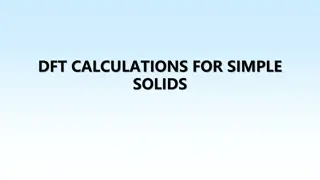

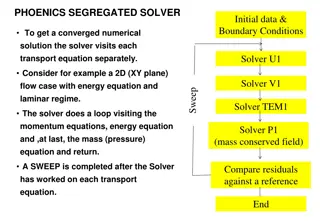
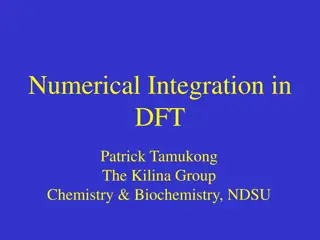
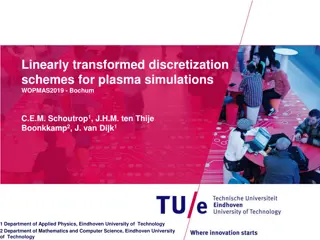
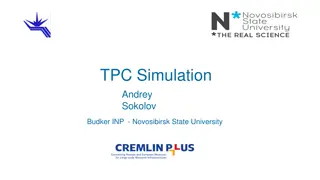
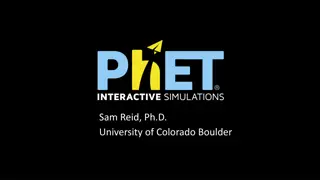
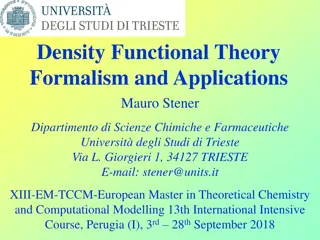
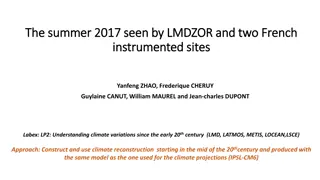
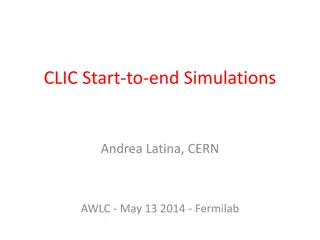
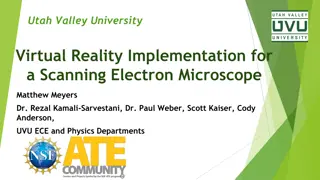
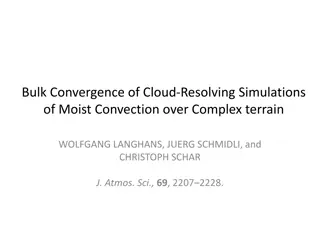
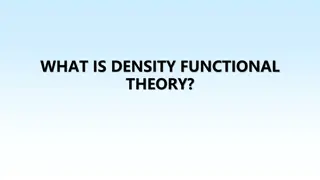
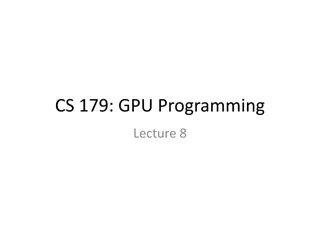
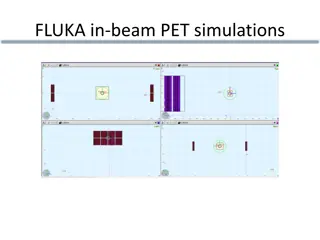
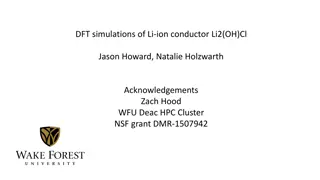
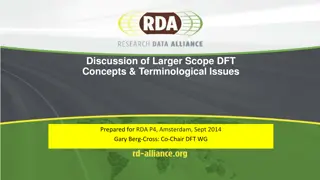
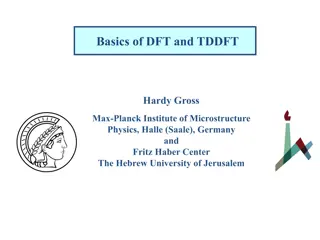


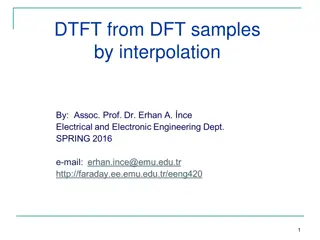


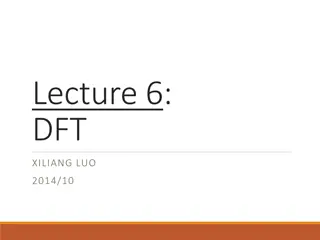

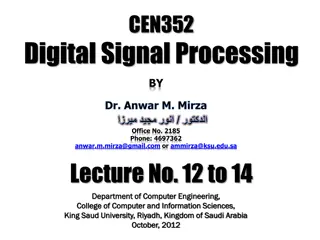
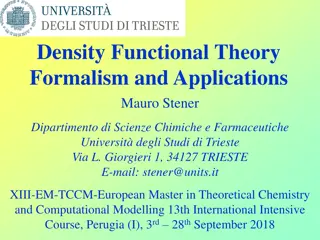


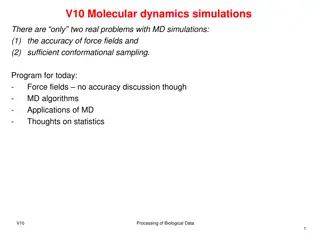




![Bridging Hydrides in [Cr(CO)5HCr(CO)5]-1](/thumb/402223/bridging-hydrides-in-cr-co-5hcr-co-5-1.jpg)
